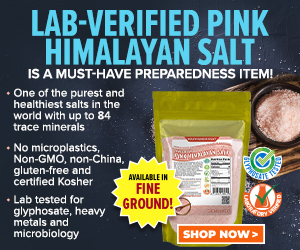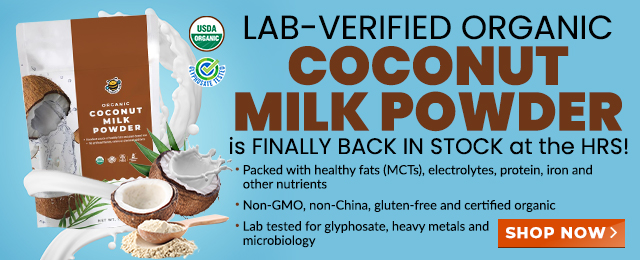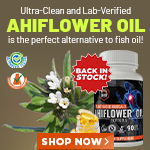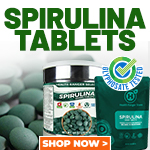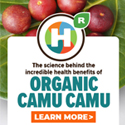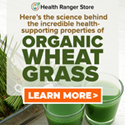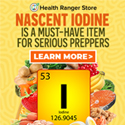
Moms can reduce risk of eczema in their babies by taking probiotics
Thursday, July 29, 2010 by: S. L. Baker, features writer
Tags: eczema, probiotics, health news
- Newly released JFK files reveal Pentagon's role in creating Lyme disease and covid in the same lab
- Oncologist warns of ‘terrifyingly aggressive’ cancers in children, linked to immune suppression from COVID vaccines
- Trump administration CUTS FUNDING to Gavi, the Vaccine Alliance - a major blow to the Bill Gates-backed entity
- Health Ranger Report: Ashton Forbes discusses TELEPORTATION ORBS and their role in MH370 disappearance
- Musk targets “strangely wealthy” lawmakers in DOGE probe, names Pelosi, McConnell, Schumer
- NIH study, buried for decades, reveals that Flu Shots INCREASE elderly deaths, not prevent them
- EPA banned chemical linked to cancer, Parkinson's and fatal heart defects in babies - now industry is lobbying to get it reinstated
- Millionaire fitness coach charged in Tesla vandalism incident as anti-Musk attacks escalate
- At least 75 percent of Americans are unknowingly MEDICATED FOR STUPIDITY by fluoridated water – Utah now banning it
- “Ethically sourced” human “bodyoids” could usher in a new era of medical exploitation, raising disturbing ethical questions
- Woman contracts WORLD'S DEADLIEST VIRUS after unknowingly being given the WRONG VACCINE
- Civil war is here – Multiple events, from conservatives being “swatted,” to attacks against Telsa owners, happening across America as Dem politicians are telling supporters to ‘fight in the streets”
- COVID-19 scandal linked to CANCER SURGE: Billionaire researcher sounds alarm
- U.K. unveils controversial pandemic preparedness tool: A double-edged sword?
- Tackling the rubber waste crisis: Groundbreaking study reveals eco-friendly method to recycle tires
- DARPA: The shadowy innovator behind the world’s most advanced military technologies
- Homesteading Boom: How families are escaping cities to grow their own food
- NYT admits U.S. ran Ukraine war operations-Russia's victory exposes obsolete NATO tactics, says Mike Adams
- Newly released JFK files reveal Pentagon's role in creating Lyme disease and covid in the same lab
- Analysis: The coming economic collapse, a mass uprising and Trump's three secret weapons to halt the growing revolt
- Trump's greatest betrayal so far: Accelerating Middle East wars, silencing dissent, and serving Zionist masters
- CDC finally halts $11 billion COVID funding scam as health officials admit the ‘pandemic’ was a fraud
- The hidden dangers in your kitchen: How cooking methods impact diabetes, cancer and aging
- Kiss Your Genetic Privacy Good-Bye! 23andMe Gets Green Light to Sell Your Intimate Genetic Details to Anyone They Want
- DEADLY DECEPTION: How COVID vaccines increased mortality rates and why authorities hid the truth
- Dr. Suzanne Humphries makes bombshell appearance on Joe Rogan podcast, exposing vaccine industry deception back to POLIOMYELITIS
- Trump nominates VACCINE ZEALOT Susan Monarez to lead the CDC, sidelining RFK Jr.'s reform efforts
- Here are TEN all-natural ways to protect your garden without using harmful chemicals
- Woman contracts WORLD'S DEADLIEST VIRUS after unknowingly being given the WRONG VACCINE
- Senate Democrats deny censorship industrial complex existed, defend government's role in silencing dissent
- Black cumin seed oil emerges as a powerful ally against breast cancer and chronic inflammation
- Sugar-free deception: Artificial sweeteners hijack hunger signals, fuel obesity epidemic, study warns
- “Independent” anti-Russia outlet MEDUZA faces COLLAPSE as US funding dries up
- The Health Ranger releases “Vaccine Zombie” song and music video, using AI-animated zombies for the music video
- Discovery of vast underground city beneath Giza pyramids challenges human history
- Key nodes of Federal Government censorship
- Newly released JFK files reveal Pentagon's role in creating Lyme disease and covid in the same lab
- California's social media censorship law struck down: A victory for free speech or a threat to online safety?
- EPA advisor admits the agency is funneling billions to climate groups ahead of Trump’s return to White House
- The Health Ranger releases “Vaccine Zombie” song and music video, using AI-animated zombies for the music video
- Dr. Mike Yeadon releases 15-minute testimony - WATCH - about genocidal intent of COVID “vaccines”
- Florida takes a stand: DeSantis proposes permanent ban on mRNA vaccine mandates
- “Why we influenced the 2020 elections”: Facebook files reveal the coordinated effort to bury the Hunter Biden laptop story
- Mike Adams releases country western hit single: Goin’ Back in Time is Comin’ Home
- The pandemic as a tool for INDOCTRINATION: Understanding “The Indoctrinated Brain” by Dr. Michael Nehls
- Unpacking the Lies That We’ve Been Fed – new song and music video released by Mike Adams, the Health Ranger
- Mike Adams releases music poetry sensation: A Child of God
- House Intelligence Committee calls for the ARREST and PROSECUTION of Dr. Anthony Fauci
- Rep. Nancy Mace introduces bill to ban biological males from female facilities on federal property
- Michigan sheriff announces criminal investigation into 2020 election crimes, Dominion Voting Systems
- Peter Rost exposes Big Pharma corruption in his book “The Whistleblower: Confessions of a Healthcare Hitman”
- Migrants are taking advantage of recent hurricanes to scam residents and loot their homes
- Sugarcane extract superior to cholesterol-lowering drugs?
- Survival 101: Effective EMF blocking techniques
- Red Cross issues warning to stop blood plasma donations from vaccinated people
- Scientists confirm: GENIUS brain function can be spontaneously unleashed in humans without any apparent cause
- EPA advisor admits the agency is funneling billions to climate groups ahead of Trump’s return to White House
- HYSSOP: What research reveals about the health benefits of this ancient holy herb
- Two containers with completed ballots fall out of truck in Florida
- Fully vaccinated about to see “tsunami” of illness and death, warns virologist
- Global leaders unite to clamp down on “misinformation” with UN-backed Cascais Declaration
- BREAKING: 2025 NDAA authorizes mandatory military draft of WOMEN across America… as Pentagon pursues global NUCLEAR war with both Russia and China at the same time
- Michael Yon warns of a ZIONIST TAKEOVER in Trump’s second administration
- BOMBSHELL: DNA testing kits are a SCAM to develop ethnic-specific bioweapons
- Ozempic and Wegovy weight loss drugs are injectable LIZARD VENOM PEPTIDES that may unleash a devastating wave of organ failure… side effects align with symptoms of SNAKE BITES
- Israeli soldiers accused of even more torture and abuse in the West Bank
- These 13 countries just signed an agreement to engineer a global FAMINE by destroying food supply
- NASA admits that climate change occurs because of changes in Earth’s solar orbit, and NOT because of SUVs and fossil fuels
- RFK Jr. clears key hurdle: Sen. Susan Collins backs controversial HHS nominee, signaling a new era for health policy
- Sermon 30: How Jesus reveals Caesar’s FAKE CURRENCY and FALSE AUTHORITY
- Coriander seeds: Ancient medicine backed by modern science
- Arizona officials claim Maricopa County needs 10-13 days to tabulate results of the election
While many babies with eczema get better before they are two, others have cases of eczema that persist into adulthood. Evidence has accumulated over the past decade that this common skin problem is connected to something going on in the gut -- and that probiotics, beneficial microorganisms similar to the "friendly" bacteria found naturally in the body's digestive system, can help.
For example, a review of 21 studies, published last year in the Journal of Allergy and Clinical Immunology, concluded probiotics were most useful in preventing atopic dermatitis, the most common type of eczema, from developing in the first place. And a groundbreaking new study, just published in the British Journal of Dermatology, found that when moms drank a probiotic supplement during their pregnancy and after their babies were born, the rate of eczema in their offspring was slashed by about half.
This research, conducted by researchers at the Norwegian University of Science and Technology (NTNU), is especially convincing because it was a randomized, double-blind study comparing mothers who drank one glass of probiotic milk daily to women who drank milk containing a placebo. The research subjects drank the probiotic or placebo-laced milk beginning at week 36 in their pregnancy and continued consuming the drinks for three months after giving birth. The results were dramatic: the women who received the probiotic drink reduced the incidence of eczema by 40 percent in their offspring.
"The taste of both products was similar, and the milk was delivered in unmarked milk cartons. This means that neither the participants in the study nor the researchers knew who had received probiotic milk or placebo milk," NTNU scientist Torbjorn Oien said in a statement to the press. "We can therefore say with great certainty that it was the probiotic bacteria alone that caused the difference in the incidence of eczema between the two groups."
In fact, although earlier studies have provided evidence that ingestion of some probiotics by children may prevent eczema, this is the first study to show that probiotics given to mothers during pregnancy and breast-feeding prevents eczema. As NaturalNews has previously reported, probiotics in dietary supplements or in food such as yogurt, have also been found to be useful and safe in treating antibiotic-associated diarrhea children (https://www.naturalnews.com/026037_Chi_altern...).
For more information:
http://www.ntnu.edu/probiotic-use-in-pregnan...
https://www.naturalnews.com/probiotics.html
http://www.ncbi.nlm.nih.gov/pubmed
http://emedicine.medscape.com/article/762045...
Eczema at FETCH.news
Get independent news alerts on natural cures, food lab tests, cannabis medicine, science, robotics, drones, privacy and more.
Take Action: Support Natural News by linking to this article from your website
Permalink to this article:
Embed article link: (copy HTML code below):
Reprinting this article:
Non-commercial use OK, cite NaturalNews.com with clickable link.
Follow Natural News on Facebook, Twitter, Google Plus, and Pinterest
Science News & Studies
Medicine News and Information
Food News & Studies
Health News & Studies
Herbs News & Information
Pollution News & Studies
Cancer News & Studies
Climate News & Studies
Survival News & Information
Gear News & Information
News covering technology, stocks, hackers, and more



"Big Tech and mainstream media are constantly trying to silence the independent voices that dare to bring you the truth about toxic food ingredients, dangerous medications and the failed, fraudulent science of the profit-driven medical establishment.
Email is one of the best ways to make sure you stay informed, without the censorship of the tech giants (Google, Apple, Facebook, Twitter, YouTube, etc.). Stay informed and you'll even likely learn information that may help save your own life."
–The Health Ranger, Mike Adams











